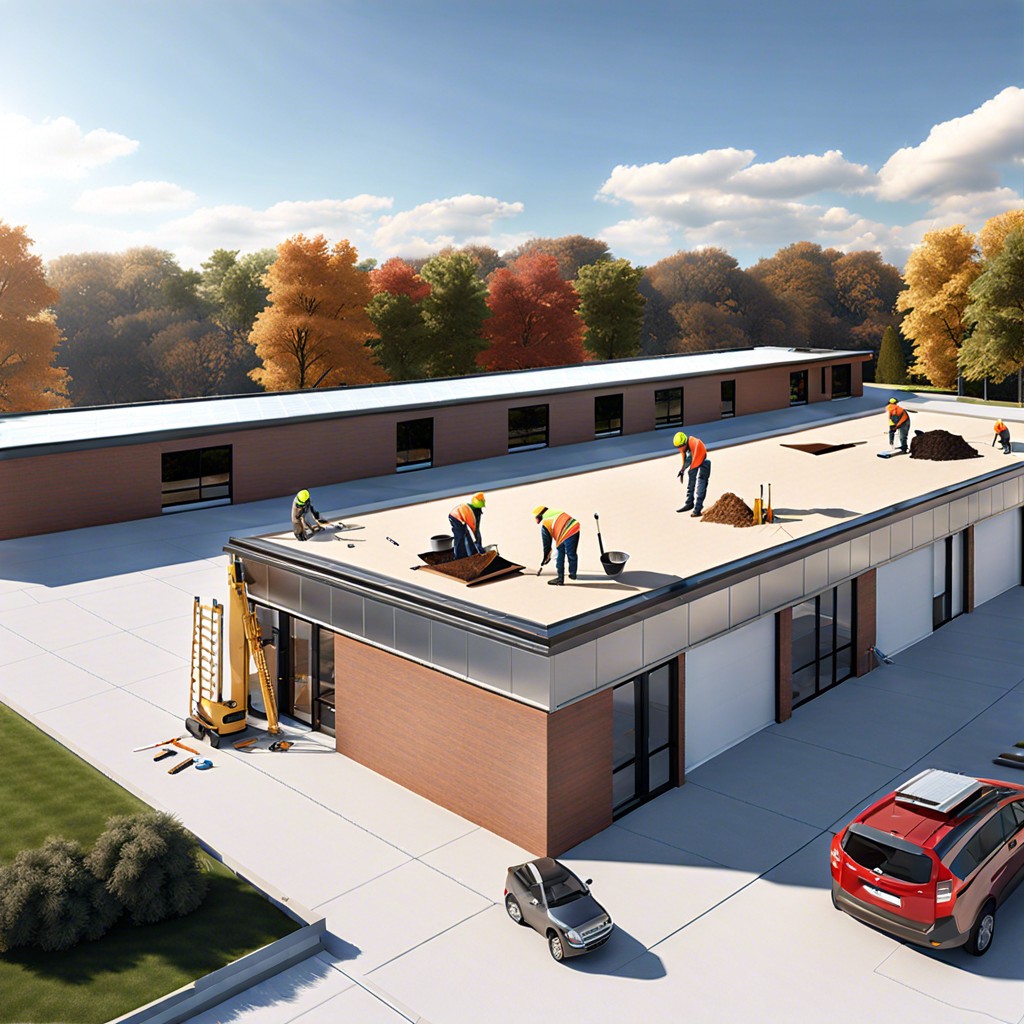Last updated on
Understanding the cost factors associated with replacing a flat roof is essential for homeowners and property managers planning for maintenance and budgeting.
Key takeaways:
- Average flat roof replacement cost: ,000 to ,000.
- Cost varies depending on size, material, and location.
- Material options include EPDM, TPO, PVC, modified bitumen, and metal.
- Factors affecting cost: material choice, roof complexity, labor, and disposal.
- Hiring professionals recommended for quality and long-term durability.
Average Cost of Flat Roof Replacement

Replacing a flat roof typically ranges between $5,000 and $10,000 for most homeowners, with the national average sitting at roughly $7,500. The cost per square foot can vary substantially, from about $4 to $10, depending on factors such as material choices and the complexity of the project.
Keep in mind that these numbers are averages and the price can fluctuate based on geographic location and market conditions. For a precise estimate, it’s important to obtain quotes from several professional roofing contractors who can assess the unique needs of your property. Remember, investing in quality materials and skilled labor can maximize the lifespan of your new roof, potentially saving you money in the long term.
Cost of a Flat Roof Replacement By Size
The area of a flat roof significantly influences replacement costs. Typically, professionals quote prices per square foot. For example, a small garage roof at 250 square feet might cost between $1,000 to $2,500 to replace, while a larger commercial space of 10,000 square feet could see prices ranging from $40,000 to $100,000.
Several factors might adjust these standard rates. The ease of access to the roof and the complexity of the job, such as working around skylights or vents, can drive the price higher. It’s essential to also account for the removal of the old roofing material, which will be a part of the overall cost. Generally, the larger the roof, the lower the cost per square foot due to economies of scale. However, ensuring you receive a comprehensive estimate based on the precise size and details of your flat roof is vital.
Cost of a Flat Roof By Material
Different materials for flat roofs come with varying price points. Here’s a look at some common options:
EPDM (Ethylene Propylene Diene Monomer), a synthetic rubber, is a popular choice for its durability and cost-effectiveness, often priced between $4.00 and $7.00 per square foot.
TPO (Thermoplastic Polyolefin) and PVC (Polyvinyl Chloride) roofing materials, known for their heat-reflective properties and strong resistance to UV rays, typically range from $5.50 to $9.50 per square foot.
Modified bitumen, a traditional roofing material favored for its reliable weatherproofing, can cost between $3.00 and $6.00 per square foot.
Built-up roofing (BUR), consisting of layers of tar and gravel, offers robust protection but is heavier and can range from $5.50 to $8.50 per square foot.
Lastly, metal roofing, while not a common choice for flat roofs, can be used in certain designs and generally starts at around $7.00 per square foot, but can go much higher for premium metals.
Remember, the actual cost will depend on the specific product grade, manufacturer, and regional pricing variations.
Factors That Affect Flat Roof Replacement Costs
A multitude of factors influence the final tally for replacing a flat roof. Material choice holds significant weight; options like EPDM (rubber), PVC, TPO, and tar and gravel each come with varying price tags and lifespans. Location also plays a key role, with market rates and climate differences affecting costs. Roof complexity, including features like chimneys, skylights, and HVAC units, can bump up the price due to the additional labor and materials needed for proper integration and sealing.
Labor costs cannot be overlooked, as they fluctuate with the level of expertise required and the location of the property. Accessibility of the roof impacts pricing as well, with hard-to-reach areas necessitating specialized equipment and safety measures, leading to higher costs. Finally, the removal and disposal of the existing roofing material can also contribute a considerable amount to the overall expense, dependent on the magnitude of the waste and local disposal regulations.
DIY Vs. Hiring a Pro to Replace a Flat Roof
Tackling a flat roof replacement as a DIY project may seem like a cost-effective solution, but it’s vital to weigh it against the benefits of hiring professionals. Roofing is a specialized trade requiring expertise, precision, and safety measures that the average homeowner may not possess.
When considering DIY, you must have the right tools and materials, which can be costly and may not be readily available. Additionally, a proper installation is crucial to avoid future issues such as leaks or structural damage; accomplishing this requires specific skills and knowledge.
On the other hand, professional roofers are equipped with the necessary tools and have access to high-quality materials often at wholesale prices. They also bring expertise that ensures the job is done right the first time, saving you potential repair costs down the line. Moreover, they can complete the job much faster and typically offer warranties for their work, which can provide peace of mind.
The decision ultimately hinges on the complexity of the roof, personal confidence in roofing abilities, and the value of time versus money. For long-term durability and security, hiring a professional is generally the recommended route.
Related
- How Much Does it Cost to Put a Metal Roof on a 2,000 Sq Ft House: Pricing Factors Explained
- Roof Replacement Cost: Factors Affecting Your Investment and How to Estimate
- Metal Roof Cost: Understanding Pricing and Value Factors
- How Much Does a Metal Roof Cost: Factors & Price Range Estimates
- How Much is a New Roof in NJ: Understanding Costs and Factors to Consider